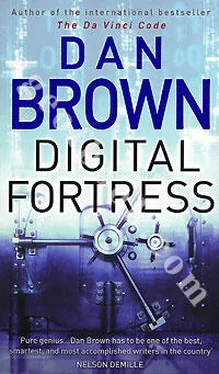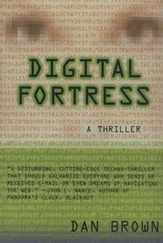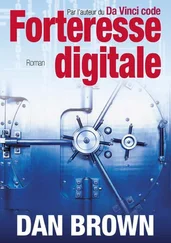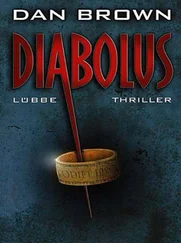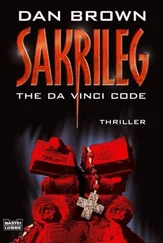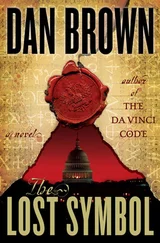“No. We’ll let him be.” Strathmore glanced over at the Sys‑Sec office. “Has Chartrukian left yet?”
“I don’t know. I haven’t seen him.”
“Jesus.” Strathmore groaned. “This is a circus.” He ran a hand across the beard stubble that had darkened his face over the past thirty‑six hours. “Any word yet on the tracer? I feel like I’m sitting on my hands up there.”
“Not yet. Any word from David?”
Strathmore shook his head. “I asked him not to call me until he has the ring.”
Susan looked surprised. “Why not? What if he needs help?”
Strathmore shrugged. “I can’t help him from here‑he’s on his own. Besides, I’d rather not talk on unsecured lines just in case someone’s listening.”
Susan’s eyes widened in concern. “What’s that supposed to mean?”
Strathmore immediately looked apologetic. He gave her a reassuring smile. “David’s fine. I’m just being careful.”
* * *
Thirty feet away from their conversation, hidden behind the one‑way glass of Node 3, Greg Hale stood at Susan’s terminal. Her screen was black. Hale glanced out at the commander and Susan. Then he reached for his wallet. He extracted a small index card and read it.
Double‑checking that Strathmore and Susan were still talking, Hale carefully typed five keystrokes on Susan’s keyboard. A second later her monitor sprang to life.
“Bingo.” He chuckled.
Stealing the Node 3 privacy codes had been simple. In Node 3, every terminal had an identical detachable keyboard. Hale had simply taken his keyboard home one night and installed a chip that kept a record of every keystroke made on it. Then he had come in early, swapped his modified keyboard for someone else’s, and waited. At the end of the day, he switched back and viewed the data recorded by the chip. Even though there were millions of keystrokes to sort through, finding the access code was simple; the first thing a cryptographer did every morning was type the privacy code that unlocked his terminal. This, of course, made Hale’s job effortless‑the privacy code always appeared as the first five characters on the list.
It was ironic, Hale thought as he gazed at Susan’s monitor. He’d stolen the privacy codes just for kicks. He was happy now he’d done it; the program on Susan’s screen looked significant.
Hale puzzled over it for a moment. It was written in LIMBO‑not one of his specialties. Just by looking at it, though, Hale could tell one thing for certain‑this was not a diagnostic. He could make sense of only two words. But they were enough.
TRACER SEARCHING . . .
“Tracer?” he said aloud. “Searching for what?” Hale felt suddenly uneasy. He sat a moment studying Susan’s screen. Then he made his decision.
Hale understood enough about the LIMBO programming language to know that it borrowed heavily from two other languages‑C and Pascal‑both of which he knew cold. Glancing up to check that Strathmore and Susan were still talking outside, Hale improvised. He entered a few modified Pascal commands and hit return. The tracer’s status window responded exactly as he had hoped.
TRACER ABORT?
He quickly typed: YES
ARE YOU SURE?
Again he typed: YES
After a moment the computer beeped.
TRACER ABORTED
Hale smiled. The terminal had just sent a message telling Susan’s tracer to self‑destruct prematurely. Whatever she was looking for would have to wait.
Mindful to leave no evidence, Hale expertly navigated his way into her system activity log and deleted all the commands he’d just typed. Then he reentered Susan’s privacy code.
The monitor went black.
When Susan Fletcher returned to Node 3, Greg Hale was seated quietly at his terminal.
Alfonso XIII was a small four‑star hotel set back from the Puerta de Jerez and surrounded by a thick wrought‑iron fence and lilacs. David made his way up the marble stairs. As he reached for the door, it magically opened, and a bellhop ushered him inside.
“Baggage, senor? May I help you?”
“No, thanks. I need to see the concierge.”
The bellhop looked hurt, as if something in their two‑second encounter had not been satisfactory. “Por aqui, senor.” He led Becker into the lobby, pointed to the concierge, and hurried off.
The lobby was exquisite, small and elegantly appointed. Spain’s Golden Age had long since passed, but for a while in the mid‑1600s, this small nation had ruled the world. The room was a proud reminder of that era‑suits of armor, military etchings, and a display case of gold ingots from the New World.
Hovering behind the counter marked conserje was a trim, well‑groomed man smiling so eagerly that it appeared he’d waited his entire life to be of assistance. “En que puedo servirle, senor? How may I serve you?” He spoke with an affected lisp and ran his eyes up and down Becker’s body.
Becker responded in Spanish. “I need to speak to Manuel.”
The man’s well‑tanned face smiled even wider. “Si, si, senor. I am Manuel. What is it you desire?”
“Senor Roldan at Escortes Belen told me you would—”
The concierge silenced Becker with a wave and glanced nervously around the lobby. “Why don’t you step over here?” He led Becker to the end of the counter. “Now,” he continued, practically in a whisper. “How may I help you?”
Becker began again, lowering his voice. “I need to speak to one of his escorts whom I believe is dining here. Her name is Rocio.”
The concierge let out his breath as though overwhelmed. “Aaah, Rocio‑a beautiful creature.”
“I need to see her immediately.”
“But, senor, she is with a client.”
Becker nodded apologetically. “It’s important.” A matter of national security.
The concierge shook his head. “Impossible. Perhaps if you left a—”
“It will only take a moment. Is she in the dining room?”
The concierge shook his head. “Our dining room closed half an hour ago. I’m afraid Rocio and her guest have retired for the evening. If you’d like to leave me a message, I can give it to her in the morning.” He motioned to the bank of numbered message boxes behind him.
“If I could just call her room and—”
“I’m sorry,” the concierge said, his politeness evaporating. “The Alfonso XIII has strict policies regarding client privacy.”
Becker had no intention of waiting ten hours for a fat man and a prostitute to wander down for breakfast.
“I understand,” Becker said. “Sorry to bother you.” He turned and walked back into the lobby. He strode directly to a cherry roll‑top desk that had caught his eye on his way in. It held a generous supply of Alfonso XIII postcards and stationery as well as pens and envelopes. Becker sealed a blank piece of paper in an envelope and wrote one word on the envelope.
ROCIO.
Then he went back to the concierge.
“I’m sorry to trouble you again,” Becker said approaching sheepishly. “I’m being a bit of a fool, I know. I was hoping to tell Rocio personally how much I enjoyed our time together the other day. But I’m leaving town tonight. Perhaps I’ll just leave her a note after all.” Becker laid the envelope on the counter.
The concierge looked down at the envelope and clucked sadly to himself. Another lovesick heterosexual, he thought. What a waste. He looked up and smiled. “But of course, Mr . . . ?”
“Buisan,” Becker said. “Miguel Buisan.”
“Of course. I’ll be sure Rocio gets this in the morning.”
“Thank you.” Becker smiled and turned to go.
The concierge, after discreetly checking out Becker’s backside, scooped up the envelope off the counter and turned to the bank of numbered slots on the wall behind him. Just as the man slipped the envelope into one of the slots, Becker spun with one final inquiry.
Читать дальше
